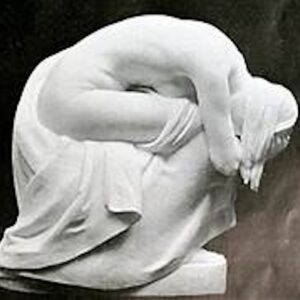This account has been deactivated.
What? My email! I need to access it. Now!
It’s a little after 5 a.m. I’m awake, once again, too early. Some mornings when this happens, I poke around on my phone a little until I fall back to sleep. Not this morning. Cut off, I’m panicked.
It’s July 1. Yesterday was my last day. Thirty-two years working for the State of North Carolina. They didn’t waste a minute. I’m no one now.
Men at forty
Learn to close softly
The doors to rooms they will not be
Coming back to.
I’m sixty-seven. I was twenty-eight when I heard Stephen Dunn read “Men at 40” by Donald Justice in a gymnasium at New Jersey’s Artist Teachers Institute. A year later I would be Justice’s student. But for now I was Stephen’s, all Stephen’s. I met Stephen when I invited him to read on a Sunday evening at the Argyle Rooster, a French restaurant in Haddonfield, N.J., where I was the assistant manager. The bar was always dead on Sundays. If we hosted some poetry readings, I told the owner, a few of my friends would show up, drink and listen. Gerry Stern read first. A couple of weeks later, Stephen.
After the reading, I asked if I could send him a few of my poems. To my surprise, when I called him a couple of weeks later he invited me to his house to talk about them. For the next couple of years, Stephen and I spent a lot of time together. He invited me to join his poetry workshop at Stockton State College, where I and a few other adult poets he had picked up here and there joined his regular undergrads. He invited me to dinners, readings, and after-parties with visiting poets: Simic, Lux. Once he drove an hour to hear me read a few poems with some other local poets at a Philly bar. Later that night, he took me to a party at what might have been C. K. Williams’s apartment. Stephen was my teacher, my mentor, my friend.
I think it was one of Stephen’s poems, maybe from A Circus of Needs, that saved me. I was back from three years in Israel, where I had fled to recover from a long, passionate, tortured, failed relationship. I was lonely, a little lost, yearning for love or sex that I kept mistaking for love.
…the heart’s an empty place
until it is filled,
and…the darkness is forever waiting
for its chance.
I don’t know if “Instead of You” was the poem that did it to me. With its dead butterfly and bat trapped in sunlight, “rabid with fear,” its beautiful blood on snow that “always lead[s]…to a wound,” its images from “real life,” and its fictions, the speaker tries in his own way “to get to you,” the poem’s addressee, a bruised woman in the “wreckage” of a relationship with the speaker.
Even after three years and a lifetime apart, I wasn’t finished yet with the woman who damaged me, the woman I damaged. She had married in the meantime, but the heart doesn’t respect vows.
I read “Instead of You” before I met Stephen for the first time. In my boyhood bedroom on Cherry Tree Lane, I said I want to do for someone else what this poem did for me, but I’ll never know if one of my poems saves someone’s life.
I stopped reading Stephen’s work after I finished graduate school. I had to. His are the poems I wanted to write. We also stopped being in touch with one another. But when I prepared to teach my final “Readings in Poetry Class,” I decided that it would only be right to go back to my beginnings. I included a few of Stephen’s poems on the syllabus, and a few of Justice’s. Then, as the spring semester wound down, I thought I should write to Stephen after all these years and thank him for giving me a life in poetry—a life of love. And maybe I should thank him in the presence of my students.
Thank God for COVID. Zoom made it possible for Stephen to join us for the final meeting of my class. I asked him to read a poem, maybe “Atlantic City,” which we had read in class. He told me that his voice wasn’t holding up anymore, advanced Parkinson’s. He’d do his best. You don’t need to read the poem or say anything, I said. Just be there to accept my thanks.
When he appeared on screen that morning, I didn’t recognize him. He was bald. He was in a wheelchair. As he had warned me, his voice was barely strong enough to speak and be understood. But he read the poem. Then he said he didn’t like the ending, which he had revised for his New and Selected Poems: 1974 – 1994.
The poem is about a man familiar with the “beautiful desolation” of the ocean in winter.
As originally published in Not Dancing, the poem ends with the speaker having turned away from the ocean, heading to his car after losing at blackjack, faced with the city:
To stare at a city half in ruin,
half in glitter,
is to know why the beach
and its beautiful desolation in winter
is a fearsome place
if one risks being calm and clear.
I wish I could say I turned around.
As revised, the poem ends this way:
To stare at a city half in ruin, half in glitter, is to know why the beachand its beautiful desolation in winter is a fearsome place if one comes to it hopeful. Please, Mister, a man said. In my car, hidden under the seat, a quarter for the toll booth.
Not only did I like the last stanza of the revised version, I had asked my students to write an entire essay on that stanza alone! But, even after all these years with poetry, what did I know?
“The “Atlantic City” poem,” Stephen wrote to me the next day, “was one of two I chose to revise when putting together the Selected, and have always regretted it. The last stanza seems flat and a tad righteous to me now, and has none of the texture that the rest of the poem has. It’s okay I suppose, but I wish I had left it alone, or just let it end on ‘hopeful’.”
I was hopeful that we’d pick up where we left off three decades earlier.
“Wonderful to have you back in my life,” Stephen wrote. “I’ve thought of you often over the years, truly, but have not acted on my impulses.”
Stephen died on June 25.
I will not be going back to rooms to talk with Stephen about poetry and love and sex. But I have the rooms and the worlds of his poems and essays to return to.
I didn’t hear the sound of my email account being deactivated. The account was restored a little after 8 a.m. on July 1. That’s where Stephen’s last message to me lives.
Richard Chess directed the Center for Jewish Studies at UNC Asheville for 30 years. He helps lead UNC Asheville’s contemplative inquiry initiative. He is a board member for the Center for Contemplative Mind in Society. He’s published four books of poetry, the most recent of which is Love Nailed to the Doorpost. You can find him at http://www.richardchess.com





